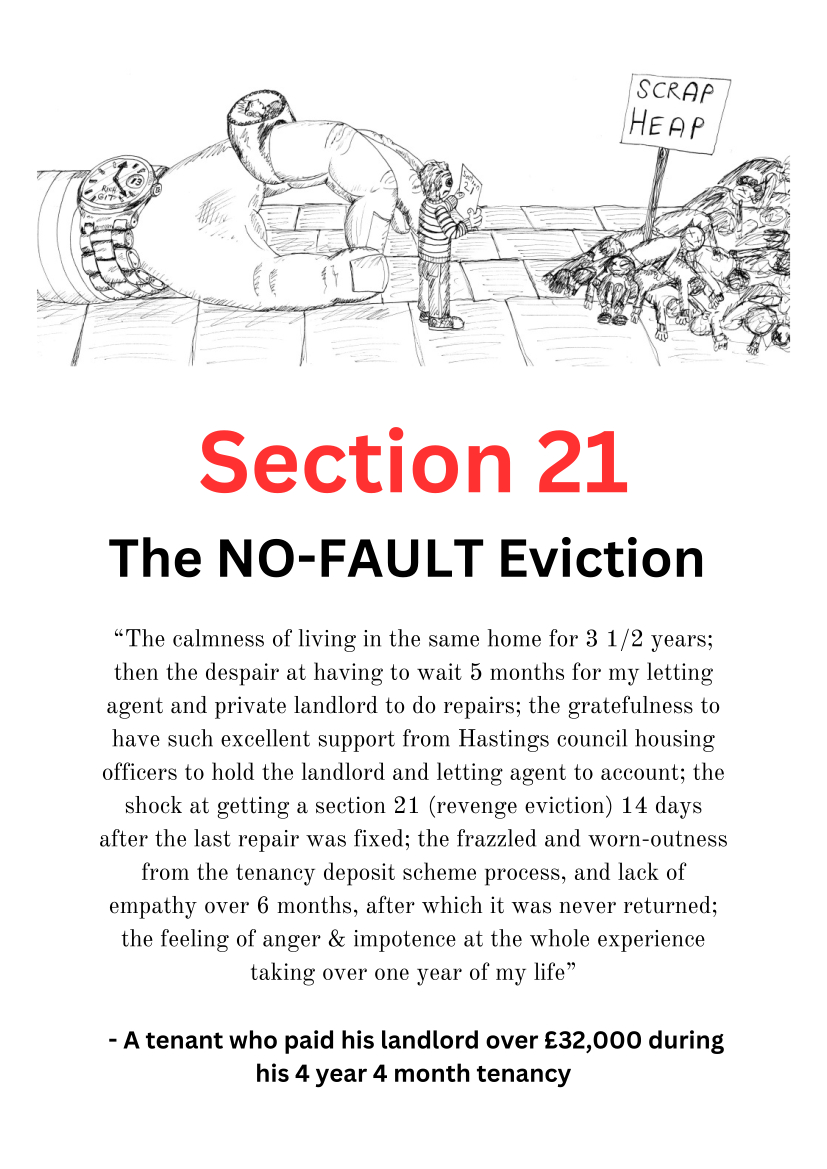A 44-year-old mother of two is facing eviction. Hana (real name withheld) is a full time carer for her nine-year-old autistic daughter, and has been a Hastings resident since her teens – but she can no longer afford to live in this town. Why?
To start with, a large number of homes are being taken off the market to become Airbnbs – about 700 since 2018, and now around 1,100 homes total. Combined with the pressure of city-dwellers seeking out a less pressured small-town life, this has dramatically increased rental demand. In turn, letting agents have irresponsibly skyrocketed local rents and their landlords have jumped on the opportunity to make or save money from these inflated new rates.
In short, there’s been a manufacturing of scarcity with real world consequences. Tenants are fearful of moving out of homes they don’t feel safe in, or reporting repair issues for homes they do want to stay in, because they can’t afford to move if the landlord refuses repairs or evicts them.
Hana’s current home has been causing both her and her daughter substantial health problems due to damp and mould, which have not been resolved by their landlord. Since she asked for this be fixed, they have been issued an eviction notice: this is what we call a revenge eviction.
Until we have tougher local powers (within the Housing Strategy currently being developed by Hastings Borough Council, for example) to safeguard private tenants who request repairs and upkeep of the properties they pay for, reporting issues to jumpy landlords is a big risk.
Renters already pay rent to cover the costs of the landlord’s mortgage, usually so that they have an asset they can sell or rent when they retire. In other words, one household is exploited to provide security for another. But now, landlords are going one step further! Tenants often face rent increases just to cover the plush lifestyles of these so-called lords, just so they don’t have to work, which is frankly obscene.
Landlords also raise rents to cover renovation costs they can’t afford, which begs the question – if you can’t afford upkeep on an additional property, should you have one? If they can’t provide decent housing, they should not be a housing provider.
Tenants are paying up to two thirds of their income in rent every month. But – according to the Campaign to Protect Rural England – affordable housing must be priced at a third of average local key worker wages (not those of high-earning digital nomads). Tenants should be able to live in a warm, safe home for that money, without the threat looming over them of losing their home altogether.
If tenants cannot afford the escalating costs of rents, the state has to step in to subsidise this with Housing Benefit or by providing temporary accommodation to those made homeless. According to the 2024 UK Housing Review, 88% of the UK’s housing budget goes into subsidising landlords because of increasingly high rents. The fault here does not lie with the people forced into homelessness – but with the landlords profiting by their own inability to provide a home, and the state effectively funding them as they do so.
Hana and her daughter are unsure when they will be ordered to leave their home, which is causing great anxiety for them both. Her daughter is scared to leave the flat for fear they won’t be able to get back in when they return home. Instead of spending their holiday season celebrating a year of joy, they spent it in terror that they might become homeless, saving money to try and sort out a move, rather than enjoying Christmas.
So Acorn – a national Community Union with a branch in Hastings – is putting out a call to action: if the bailiffs come for this family before they can afford to move, can you help other good folks block the eviction? This would at least give time to organise accommodation with the council, or (if they’re really lucky) find an affordable home. If you would like to help and be called on in the event this happens, contact Acorn via hastings@acorntheunion.org.uk or 07726739077.
Subscribe
Login
0 Comments
Newest

